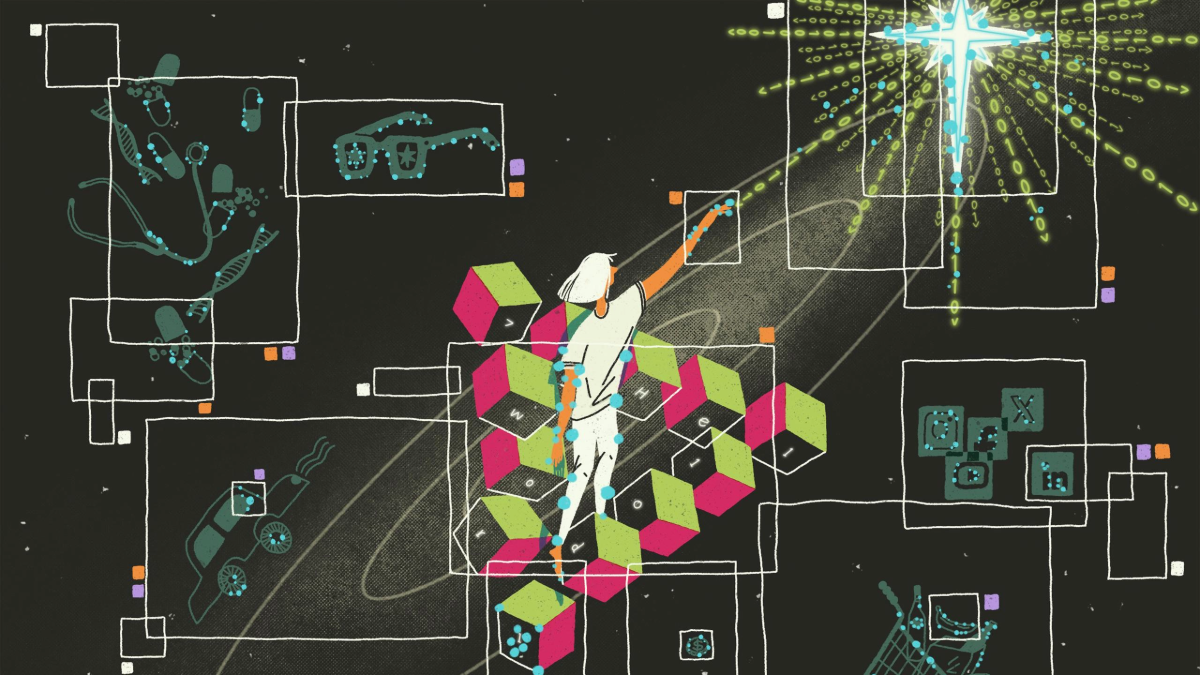Society Needs Higher Education to Train Ethical Technologists
Janyl Jumadinova / Jan 13, 2025
Yutong Liu & The Bigger Picture / Better Images of AI / AI is Everywhere / CC-BY 4.0
In today's technology-driven world, computing is integral to our lives. Governments and companies use computing to automate processes, analyze data, and provide better services to their citizens and users. This has resulted in governments and companies holding a great amount of power, sometimes resulting in harmful misuse of technology and exacerbating concerns around privacy, cyber security, algorithmic bias, data protection, and other safety issues related to artificial intelligence. Unrestrained systems can lead to a lack of accountability, allowing for opportunistic and predatory behaviors that lead to data breaches, privacy violations, cyber attacks, and online harassment, with serious consequences for individuals and society. Higher education institutions play a crucial role in addressing these ethical issues and preparing students for the workforce as holistic and responsible technologists.
As a core part of our belief in educating responsible, ethical citizens, those working in higher education must answer the growing professional demand for technologists with computing degrees that address the field's professional and ethical qualifications and imperatives. While it can be challenging and often subjective to navigate the process of technology creation and use in businesses, it is important for individuals and organizations to be mindful of the potential consequences of their actions and to strive for transparency and informed consent in all aspects of technology use. By instilling a sense of responsibility and accountability in those who design and implement technology, we can equip the next generation of technologists with the knowledge and tools to create technology that benefits society rather than harms it.
To identify principles to follow when creating autonomous systems, the Biden White House released a Blueprint for an AI Bill of Rights. These principles, developed by scientists and practitioners, include building protections against algorithmic discrimination, creating safe and effective systems, ensuring data privacy, providing notice and explanation of automated systems in use, and offering a human alternative.
Using frameworks such as the Blueprint as a model, higher education institutions must develop and follow their own principles to guide our educational practices in the era of fast technological innovations. I would encourage higher education institutions with computing programs to consider the following multi-faceted principles that provide a pathway to a diverse, creative, and thoughtful new technologists workforce:
1. Integrate ethics and responsible computing into all computer science courses.
Higher education institutions offering computing-related programs are responsible for infusing ethical considerations as a part of their computing curriculum that includes theoretical knowledge about ethics and practical examples and case studies of ethical issues that have arisen in the field. This helps future technologists develop a deeper understanding of the impact of technology on society and the ethical responsibilities that come with working in computing fields.
For example, as technology advances, the collection and use of personal data has become a growing concern. Teaching students about data privacy laws, such as Europe’s General Data Protection Regulation (GDPR), and the ethical considerations around data collection and use, will help create future technologists who know how to design and implement systems that prioritize privacy and how to assess the risks associated with data collection and use. The computing faculty at Allegheny College, my home institution, recognizes that technology is not neutral and that creators of technology make choices that have social implications. We have integrated ethics and responsible thinking into the computer science curriculum by developing and deploying activities, assignments, labs, and discussions in every computing course in the department.
To equip students with skills to navigate ethical issues that arise in their future careers, we also found that incorporating hands-on practice activities in ethical decision-making is essential. This can be accomplished by giving students an opportunity to practice how to recognize ethical dilemmas, analyze them, and make informed decisions based on their values and ethical principles. Finally, when infusing ethics into the computing curriculum, it is essential to implement assessment practices to help ensure the integration is fulfilling its goals.
2. Promote social responsibility inside and outside of the classroom.
In addition to the responsibility of integrating ethics in computing curricula, we as educators have an opportunity to enhance the culture of our departments by promoting the culture of social responsibility and ethics inside and outside our classrooms. One way to promote ethical behavior is by establishing codes of conduct for students, faculty, and staff. These codes of conduct should clearly articulate the ethical principles and values expected of community members and should have measures to hold individuals accountable for their conduct.
Having a diverse and inclusive environment with a sense of community and belonging can also help develop a sense of social responsibility. Computing-related programs must commit to creating and sustaining a culture of inclusive excellence to counter historical and prevailing recognized issues with diversity and inclusion in technical industries and education. This can be accomplished by setting and sticking to the structured model of positive student-faculty and student-student collaborative interactions and encouraging participation in departmental clubs, groups, and events. Computing departments can make resources such as videos, podcasts, and reading material highlighting ethical issues in technologies available to students during department or club events. Additionally, engagement of computing students and faculty with the broader community by participating in outreach programs and community service projects can help students develop a sense of social responsibility and a deeper understanding of the impact of computer science on society.
3. Offer opportunities for intersections of computer science with humanities.
Connections across disciplines are important for computer science as the reach of technology stretches into nearly all aspects of modern life. In addition to being exposed to new perspectives and ways of thinking during any cross-disciplinary collaborations, collaborations with students and faculty in humanities specifically can help computer science students better understand the social and ethical implications of their work.
Humanists are trained to analyze cultural and social phenomena critically and can provide a critical and reflective perspective on technology's social and cultural dimensions. Expertise in philosophy, ethics, history, literature, and cultural studies, among others, can be applied to the study of the social and cultural impact of technology by the individuals who are going to create this technology. For example, the use of facial recognition has become an increasing concern, with its applications ranging from law enforcement and security to marketing. By intersecting with humanists, computer scientists can interrogate the social and cultural contexts in which this technology is used, explore how facial recognition affects social norms and relationships, and investigate its impact on individual privacy and civil liberties.
Developing a deeper analysis of the impact of technology can help computer scientists create technologies that are sensitive to the social and ethical implications of their use and contribute to a more just and equitable society. These intersections can take various forms in an educational setting, from individual courses to interdisciplinary programs and centers where faculty and students of various disciplines can collaborate. For example, faculty can find deliberate ways of intersecting their humanities and computer science courses that touch upon similar topics or themes. This can take the form of joint class sessions, discussions, or a common course project theme with an opportunity for humanities and computer science students to provide feedback on each other’s projects. A bigger systemic change to building connections between humanities and computer science does, however, need to involve the commitment of the institution to emphasize the importance of collaboration and interdisciplinary thinking. This also involves recognizing the value of diverse perspectives and creating a culture that supports and encourages cross-disciplinary collaboration.
4. Provide post-graduate upskilling programs infused with ethics.
Following the CHIPS and Science Act of 2022, the National Science Foundation has been assessing the capacity of higher education institutions to produce graduates with degrees, certifications, and relevant skills related to artificial intelligence. However, despite the evident need for education in artificial intelligence, Daniel S. Schiff, assistant professor of technology policy at Purdue University’s Department of Political Science and the co-director of GRAIL, the Governance and Responsible AI Lab, notes that guidance on education in artificial intelligence is largely absent in published policies, ethics codes, and frameworks.
Higher education institutions can use the current demand for education in technologies to infuse ethics into their current programs and partner with the industry to provide the latest technical training to their workers while emphasizing the ethical and social dimensions of the studied technologies. Many higher education institutions have been investing in computing-related programs over the past few years, including developing certificate and micro-credential programs. The need to upskill the current workforce is substantial, given fast technological advancements. Institutions can partner with industry to create collaborative programs that focus on upskilling the existing tech workforce while also focusing on ethics and social responsibility. Certificate and micro-credential programs can effectively complement traditional higher education programs as they provide targeted and flexible training to professionals who want to develop specific technical skills in a shorter time frame. However, most such programs strictly focus on technical skills, forgoing the opportunity to train these professionals to think more critically about how new technology serves the public interest. Using the expertise and infrastructure they have in place, higher education institutions can develop upskilling opportunities that incorporate both relevant technical content and promote responsible and ethical practices.
Infusing these guiding principles into higher education pedagogy can greatly benefit our institutions in fulfilling their mission of preparing the next generation of thoughtful leaders and citizens. These individuals will not only be skilled technologists but also responsible technologists committed to making a positive impact on society. They will play a vital role in shaping an equitable and just future.
Authors
